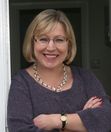Jessica Hart's Blog, page 5
February 14, 2012
Champagne truffles and royal weddings
Happy Valentine's Day! I'm still waiting for my truckload of roses to arrive, but it's early yet …
However, there was a lovely surprise this morning with the delivery of a gorgeous box of pink champagne truffles from Mills & Boon, with congratulations for Ordinary Girl in a Tiara's nomination for the RoNA Rose award. What could be nicer than a totally unexpected present?
And talking of the RoNA Rose award, Liz Fielding and I can be found on the Harlequin Romance Authors today blogging about the inspiration behind our short-listed books, so do pop over there and have a read. Liz has a photo of the perfect Roman balcony that I can quite see as inspiration for Flirting with Italian.
I'm talking about the hours of onerous research I did on royal weddings, and here's a sneak preview of the video that made even me go 'Aaawwww …'
Published on February 14, 2012 01:37
February 11, 2012
Third time lucky?
After yesterday's excitement, I settled down at last to finish what was supposed to be a final draft and ended up a Shitty Second Draft. At 157 pages (42,410 words) it was a pretty full draft, so I was relieved to get to the end.
Now I'm going to chuck it out and start again from scratch.
Oddly, this decision feels better than trying to rework what I've done. Somewhere in the process, I've got to know Frith and George and they're not the cardboard characters who have been going through the motions for the last 157 pages. So, deep breath, and fingers crossed that this draft will be the one where everything clicks.
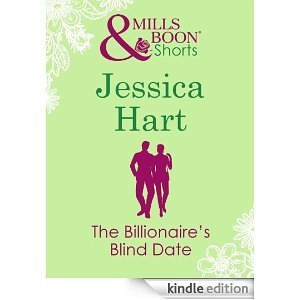 I was so taken up with the RoNA Rose short-listing that I forgot to mention that The Billionaire's Blind Date is now available as a digital download from the Mills & Boon site or Amazon.
I was so taken up with the RoNA Rose short-listing that I forgot to mention that The Billionaire's Blind Date is now available as a digital download from the Mills & Boon site or Amazon. A novella, The Billionaire's Blind Date was originally part of a special anthology released in the UK as All in a Day and as a duet called Here Comes The Bride in North America.
Linked to Christmas Eve Marriage, The Billionaire's Blind Date is the story of Clara's mother, Nell and how her life changes completely in just 24 hours.
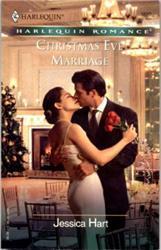 The brief, a story that took place within a single day, had me scratching my head at first, but in the end the strict limits were strangely liberating, and I remember enjoying writing this story a lot. Plus, I always loved Clara in RITA-winning (just thought I'd get that in!) Christmas Eve Marriage, so I was very glad to make her happy too!
The brief, a story that took place within a single day, had me scratching my head at first, but in the end the strict limits were strangely liberating, and I remember enjoying writing this story a lot. Plus, I always loved Clara in RITA-winning (just thought I'd get that in!) Christmas Eve Marriage, so I was very glad to make her happy too! There's something very appealing about coming across characters that you're already familiar with from another book, I think. I'd like to write more linked books, but it seems to be hard enough to write one at the moment, let alone a whole series. But one of these days ...
Published on February 11, 2012 04:47
February 10, 2012
RoNA Rose Award
 Exciting news to announce this morning … Ordinary Girl in a Tiara has been shortlisted for the RNA's RoNA Rose Award!
Exciting news to announce this morning … Ordinary Girl in a Tiara has been shortlisted for the RNA's RoNA Rose Award! The RoNA Rose Award (formerly Love Story of the Year and before that the Romance Prize) recognises the best in category and shorter romance, and it's an honour to be on the shortlist with writers like Liz Fielding and Kate Hardy. There are three historicals also on the list, from Jan Jones, Sarah Mallory and Mary Nichols, so Ordinary Girl is up against some very tough competition!
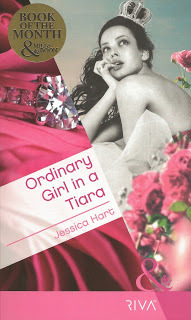 I have to say the news was a (very nice) surprise. Readers with long memories might recall that this was the book that I nearly hit the wall with, and I had to give up on it entirely before I went to Australia in 2010. So it's reassuring to know that the pain pays off in the end … and a helpful reminder as I continue to struggle with Frith and George!
I have to say the news was a (very nice) surprise. Readers with long memories might recall that this was the book that I nearly hit the wall with, and I had to give up on it entirely before I went to Australia in 2010. So it's reassuring to know that the pain pays off in the end … and a helpful reminder as I continue to struggle with Frith and George!The Romantic Novelists' Association awards celebrate romance fiction in its many different forms. See its awards website for books shortlisted in other categories. Winners will be announced at an awards ceremony in London on 5th March and I predict another wardrobe crisis nearer the time!
Published on February 10, 2012 04:28
February 6, 2012
Sneak peek
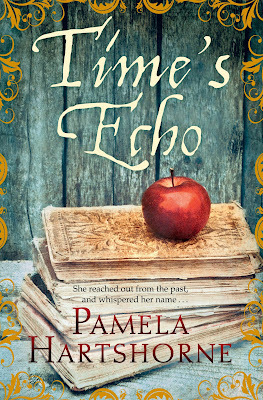 Wondered if you'd like a sneak preview of the cover for Time's Echo, which is out in September …
Wondered if you'd like a sneak preview of the cover for Time's Echo, which is out in September … This is a "time slip", written under my own name, as you can see, and it's a major departure from category romance for me. So a very different cover from my others!
Here's the provisional 'blurb' to give you some idea of what will be on the back cover:
York , 1575: Hawise Aske smiles at a stranger in the market, and sets in train a story of obsession and jealousy, of love and hate and warped desire. Drowned as a witch, Hawise pays a high price for that smile, but for a girl like her in Elizabethan York, there is nowhere to go and nowhere for her to hide.
Four centuries later, Grace Trewe travels the world, trying to outrun the memories of being caught up in the Boxing Day tsunami. Her stay in York is meant to be a brief one.
But in York Grace discovers that time can twist and turn in ways she never imagined. Drawn inexorably into Hawise's life, Grace finds that this time she cannot move on. Will she too be engulfed in the power of the past?
I love this cover. To me, it's intriguing and conveys the 'feel' of the story, and I was thrilled when I saw it. The point of a cover is to tell the reader what kind of story they're going to get when they open the book, and I think this cover 'says' "time slip", the way the cover of We'll Always Have Paris, for instance, 'says' category romance.
What do you think? Is this the kind of cover that would make you pick up a book, or do you prefer your novels with a clearly contemporary or clearly historical setting?
Published on February 06, 2012 01:01
January 31, 2012
What a difference a weekend makes
 Fabulous weekend with the Chief Plotting Advisor: eating, drinking, shopping, walking, plotting, detoxing wardrobe … We both agreed that we couldn't afford to spend any money, went into town to buy some eye drops for CPA, and came home several hours later laden with carrier bags. Let's hear it for retail therapy.
Fabulous weekend with the Chief Plotting Advisor: eating, drinking, shopping, walking, plotting, detoxing wardrobe … We both agreed that we couldn't afford to spend any money, went into town to buy some eye drops for CPA, and came home several hours later laden with carrier bags. Let's hear it for retail therapy. All that, and George Clooney too! Not in person, sadly, but on screen in The Descendants, which I thought was pretty good, although I am by inclination more of romcom girl. But it was wonderfully unsentimental and very well acted. I laughed at some bits, and cried at another, and was absorbed throughout. I have a very low boredom threshold, and it takes a lot to hold my attention, so George definitely gets my Oscar nomination.
Oh, and as if that wasn't a good enough time, we booked a holiday. The Dingle Way, here we come! Had to endure the torture of booking a flight with Ryanair online (aaaarrrgghh) but apparently there is no other sensible way to get to Kerry. Anyway, it's done, and we're going to Ireland at the end of May so fingers firmly crossed now for some decent weather. We're going to walk the whole Way, all 112 miles of it, and it does look beautiful … if only we can see it through the rain!
All in all, am feeling in a much better mood than when I blogged last week. Douglas is still being silly about the cat flap, but I am standing firm. As for Frith, I've decided to succumb and carry on with this draft in the first person, since she seems to want it so much. Let her write this story if she's so determined to. This is my last job before I start work again, and I'm handing over to her, so we'll see how she gets on …
Published on January 31, 2012 11:31
January 27, 2012
First aaaarrrggghhh of 2012
So, this is the way it goes. I start a book, brimming with confidence. I have written 50+ books before, and therefore I know what needs to be done, right? I only need six weeks.
I rattle off a rough draft, not worrying that it's rubbish, because that's all part of the process. Then – vital stage – I write myself out a timetable, and I'm kind to myself. A bit too kind, perhaps. The very first day, I only told myself to write a single page (and it was a struggle, too!). Now I'm ahead of schedule.
But what's the point of being ahead of schedule when the story isn't working, the characters are leaden and every word is an effort? I'm going to have to go back to the beginning and start all over again. Am not sure if it's a good sign or a bad sign that I am still on Chapter 2, and usually make myself labour on until Chapter 7 before hitting crisis point.
Anyway, this too is part of the process, so why am I panicking? I'm not panicking (much). I just so hate this part when the characters refuse to come to life and I can't imagine ever getting any momentum going. I know it will happen (please God, let it happen soon!) but until that wonderful click when it all falls into place, I'm just plodding away and feeling desperate, which is not quite the same as panicking, but nearly as bad.
Part of the problem may be the nagging feeling I have that Frith wants to write her own story. I'm resisting this because (a) readers traditionally don't like romances written in the first person, and (b) I'm the author, which means I ought to be in charge. How many books has Frith written, after all? Once we let these characters off the leash, who knows where it will all end? It's all reminding me uneasily of my on-going battle of wills with Douglas, a very pretty but very stubborn tabby, who is refusing to use the new cat flap I had installed at great expense. Clearly, it's time for me to wrest control back and for cats and characters to learn their place.
And control is badly needed, as I have agreed a deadline at last with my editor and there can be no more messing around. (Are you listening, Frith?) My Chief Plotting Advisor is coming to stay this weekend, and she'll have no truck with recalcitrant characters. I'm banking on Frith, Douglas and I all being smacked into shape by Monday, at which point I can get back to normal procedure, i.e. writing the entire book in a rush of adrenaline just before the deadline.
Ironically, this blog has been nominated for a top writing blog award – see button top right of the page and feel free to vote! – allegedly because of useful advice about writing. So if anyone's reading this in the hope of picking up tips, here's my absolute top one: do as I say, not as I do.
Published on January 27, 2012 09:03
January 22, 2012
A tale of two covers
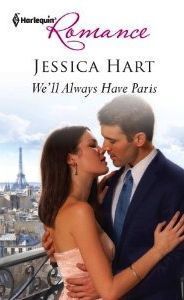 As you must all be sick of hearing, We'll Always Have Paris is out this month in the UK. For reasons I don't quite understand, it's not out in North America until April, so I haven't had any author copies of that edition yet. However, I stumbled upon the cover on Amazon the other day, and very pleased I am with it too. My usual reaction to a cover is a 'hhhmmmnnn' at best, but I like this one.
As you must all be sick of hearing, We'll Always Have Paris is out this month in the UK. For reasons I don't quite understand, it's not out in North America until April, so I haven't had any author copies of that edition yet. However, I stumbled upon the cover on Amazon the other day, and very pleased I am with it too. My usual reaction to a cover is a 'hhhmmmnnn' at best, but I like this one. The Paris background is just the bluey-grey colour I always associate with Paris, and the heroine looks pretty much like I imagined Clara. Simon Valentine is a buttoned-up economist, so the suit and tie work well for him. And they're absorbed in each other, unlike the couple on the front of the RIVA edition, where she looks downright sulky, I think, and he looks as if he should really be at school.
 The Simon on the front of the NA edition does at least look as if he might have a degree in economics. He reminds me of Ben Affleck in Armageddon (Remember that film? I'm a big fan of disaster movies, as we all seem to call them now, and Armageddon was one of my faves. Now that was plotting and pace.) Here's a picture of Ben in the film: am I right or am I right?
The Simon on the front of the NA edition does at least look as if he might have a degree in economics. He reminds me of Ben Affleck in Armageddon (Remember that film? I'm a big fan of disaster movies, as we all seem to call them now, and Armageddon was one of my faves. Now that was plotting and pace.) Here's a picture of Ben in the film: am I right or am I right?  The background is also disquietingly similar to the famous shot in the film when Paris is wiped out by an asteroid – when they didn't always have Paris, in fact. Now every time I look at the cover, I want to shout, 'Hurry up and kiss! There's an asteroid heading your way!'
The background is also disquietingly similar to the famous shot in the film when Paris is wiped out by an asteroid – when they didn't always have Paris, in fact. Now every time I look at the cover, I want to shout, 'Hurry up and kiss! There's an asteroid heading your way!'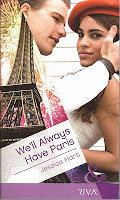 I suppose the NA edition is a little more old-fashioned, while the RIVA cover (right) is sharper and more contemporary, as befits the story (or so I think).
I suppose the NA edition is a little more old-fashioned, while the RIVA cover (right) is sharper and more contemporary, as befits the story (or so I think). I've always had a shameful tendency to judge a book by its cover, so covers are really important to me when it comes to whether I'll pick up a book or not and I suspect they also influence how I read it too. What about you?
Published on January 22, 2012 07:30
January 19, 2012
The eternal dilemma
 Very excitingly, I have been invited to a glamorous party in London next week (at least, it sounds glamorous to me, although maybe I'm being provincial and invitations to publishers' parties are two a penny to my metropolitan sisters in the south). Anyway, Pan Macmillan are holding a party to celebrate women's fiction, at the Sanctuary Spa in Covent Garden, and like Cinderella, I will go to the ball.
Very excitingly, I have been invited to a glamorous party in London next week (at least, it sounds glamorous to me, although maybe I'm being provincial and invitations to publishers' parties are two a penny to my metropolitan sisters in the south). Anyway, Pan Macmillan are holding a party to celebrate women's fiction, at the Sanctuary Spa in Covent Garden, and like Cinderella, I will go to the ball.Unlike Cinderella, I have no fairy godmother to wave a wand and supply me with just the right outfit for the occasion. The Sanctuary is a women only spa and the last time I went, admittedly more than 25 years ago, none of us wore anything at all. I'm guessing it will be a different dress code this time, but what?
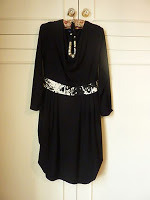 I so wish I was one of those women who don't give the matter of what to wear a moment's thought until a few minutes before they go out, at which point they pull out the perfect little dress from their wardrobes, or even better, throw together a funky mix of vintage and cheap'n'cheery that looks fabulous. Whenever I ask them where they got any of it, the reply is always something along the lines of "Oh, this old thing? I got it from M&S", or "I picked it up at a market in Rajasthan" or something equally infuriating. I never see any of these supposed bargains when I go shopping.
I so wish I was one of those women who don't give the matter of what to wear a moment's thought until a few minutes before they go out, at which point they pull out the perfect little dress from their wardrobes, or even better, throw together a funky mix of vintage and cheap'n'cheery that looks fabulous. Whenever I ask them where they got any of it, the reply is always something along the lines of "Oh, this old thing? I got it from M&S", or "I picked it up at a market in Rajasthan" or something equally infuriating. I never see any of these supposed bargains when I go shopping. I have, it is true, a wardrobe full of clothes, but none of them ever seem to be quite what I need. So instead of being properly thrilled at the prospect of a party, I am fretting about the eternal problem of what to wear.
When I went before, the Sanctuary was tropically warm inside, with parrots flying around over the palm trees. I suppose they might have updated the decor in 25 years, but surely it's a place for casual dress - but at 6.30 in the evening, presumably most people will be going from work, in which case they might be quite smart (unless they're other writers who get to slob around in comfy elasticated waist trousers all day). I'm taking train from York and coming back same night, which means I need to wear something warm enough and comfortable enough for 4 hours on the train, but light enough and smart enough for party. You see my problem.
On top of which, I want to look as if I haven't tried too hard, and give the impression that yah, I go to publishing parties all the time as I run my fingers through my blonde tresses. (Curses, too late to get new streaks put in). On the other hand, I will be the new girl, so should make an effort … oh, dear, it's all so difficult.
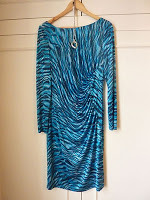 I keep buying dresses, only to take them back the next day when I realise I can't carry them off. I was determined not to wear black, as it's so safe, and have been fantasising about a wrap dress in just the right shade of scarlet, although can I find one in York? There are plenty of wrap dresses around, and even red ones, but they've got silly patterns or are the wrong length or don't fit right … Yesterday, I went for a completely different look and brought home a slinky blue dress from L.K. Bennett, but this one was vetoed by Senior Style Advisor because she doesn't like swirls, while Chief Plotting (and Style) Advisor doubted whether I had the chutzpah to carry it off. Sadly true.
I keep buying dresses, only to take them back the next day when I realise I can't carry them off. I was determined not to wear black, as it's so safe, and have been fantasising about a wrap dress in just the right shade of scarlet, although can I find one in York? There are plenty of wrap dresses around, and even red ones, but they've got silly patterns or are the wrong length or don't fit right … Yesterday, I went for a completely different look and brought home a slinky blue dress from L.K. Bennett, but this one was vetoed by Senior Style Advisor because she doesn't like swirls, while Chief Plotting (and Style) Advisor doubted whether I had the chutzpah to carry it off. Sadly true. 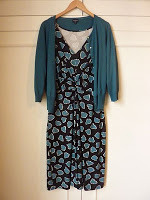 So then I decided I was being ridiculous, had wasted enough time on the matter, and should just find something to wear from my wardrobe. Out came the old favourites to be thrown over the bed, but it's funny how tired everything looks after a few months go by … I had a pretty dress from Hobbs last summer, which would do except for the fact that it's January now, and as CPA pointed out, the exact same dress has been hanging around on the sale rails for weeks now.
So then I decided I was being ridiculous, had wasted enough time on the matter, and should just find something to wear from my wardrobe. Out came the old favourites to be thrown over the bed, but it's funny how tired everything looks after a few months go by … I had a pretty dress from Hobbs last summer, which would do except for the fact that it's January now, and as CPA pointed out, the exact same dress has been hanging around on the sale rails for weeks now. 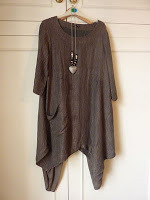 Or I could go ethnic in sludge green, or comfortable with leggings and a forgiving top from Sahara, but I was sharply slapped down for this suggestion: "enough of the leggings already. If this is a party you need to wear a party outfit, with heels FFS."
Or I could go ethnic in sludge green, or comfortable with leggings and a forgiving top from Sahara, but I was sharply slapped down for this suggestion: "enough of the leggings already. If this is a party you need to wear a party outfit, with heels FFS."The upshot of all this style consultation was that I will be playing it safe and going in – guess what? – a black dress. Never mind, at least the decision is made, and as my mother always pointed out "Nobody's interested in you, dear", (not realising that was precisely what I was worried about). So now I just need to fret about finding someone to talk to at the party. Maybe the parrots will take pity on me.
Published on January 19, 2012 05:05
January 16, 2012
Jessica Hart goes historical
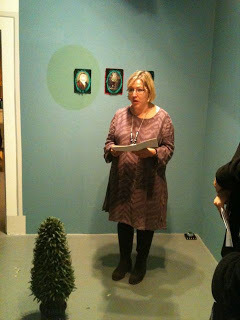 My first reading
My first readingA big day last Friday: my first foray into the art world, my first attempt at an historical romance, and my first reading.
I'd been invited to write a short romance based on Joshua Reynolds's portrait of the infamous Lady Seymour Worsley as part of artist Hayley Lock's exhibition, (Now That Would Be) Telling. The project has centred around five stately homes in England, whose histories become the starting points for new works by Hayley, and at each house a different writer creates backstories for the characters.
My story is based in the fictional Caddington Hall. The original Hall was demolished in the 1970s but Hayley's work creates an alternative history for the house, hosted by Transition Gallery in London's East End, and that is where we went on Friday to launch the final chapter of the exhibition and for me to read my work for the first time.
Lady Worsley was reputed to have had 27 lovers, and Hayley has created exquisitely detailed portraits of each of them, their anonymity emphasised by the absence of any faces. My brief was just to write a short romance inspired by Lady Worsley's portrait (now in Harewood House). It didn't have to be true, or accurate, although I did use many of the details of Seymour's life as background to the story that took shape in my head, In reality, Lord and Lady Worsley divorced, and while having 27 lovers makes for an interesting story, it certainly doesn't make a romantic one.
For it to be a romance, I felt her story had to be one in which her marriage ended happily, so I imagined her at cross-purposes with her husband, with neither of them realising that the other had married for love. Any fans of Georgette Heyer will immediately recognise shades of April Lady and The Convenient Marriage in this imagining, and I have to hold up my hand and admit that my entire knowledge of this period is gleaned from Heyer's wonderful books.
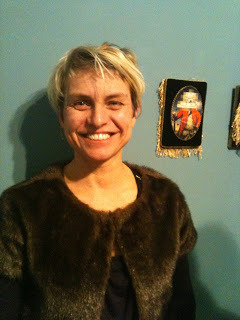 Hayley Lock with one of the 27 loversI love historical romances, particularly Regencies, and writers like Loretta Chase, Mary Balogh and Annie Gracie are among my absolute favourites, but my romance voice is a contemporary one, I think, whether I like it or not. What you like to read isn't always what you're able to write. If it were, I'd be writing thrillers and historical romances or romantic suspense. As it is, the chance to have a stab at writing a historical romance without worrying too much about whether a detail was authentic or not was really liberating, and I had a great time. What a treat not to have to plot an entire book, too. The story I wrote deliberately breaks off in the middle of a scene, allowing the reader to imagine their own ending, and to decide whether those 27 lovers were really part of the story or not. But who knows? Maybe one of these days, I'll finish the story myself …
Hayley Lock with one of the 27 loversI love historical romances, particularly Regencies, and writers like Loretta Chase, Mary Balogh and Annie Gracie are among my absolute favourites, but my romance voice is a contemporary one, I think, whether I like it or not. What you like to read isn't always what you're able to write. If it were, I'd be writing thrillers and historical romances or romantic suspense. As it is, the chance to have a stab at writing a historical romance without worrying too much about whether a detail was authentic or not was really liberating, and I had a great time. What a treat not to have to plot an entire book, too. The story I wrote deliberately breaks off in the middle of a scene, allowing the reader to imagine their own ending, and to decide whether those 27 lovers were really part of the story or not. But who knows? Maybe one of these days, I'll finish the story myself …You can see Hayley's wonderful portraits at Caddington Hall at Transition Gallery until 5 February 2012. In the meantime, here is my attempt at an historical romance (and no, I won't be giving up the day job!)
'Oh, Sarah, you look so …so bold!' Emma had been horrified when she saw the half-finished portrait of her sister en militaire. 'I cannot think Sir Richard will approve.'Now Sarah wondered if Emma was right. She stole a glance at her husband under her lashes as he studied the portrait with an impenetrable expression. They might have been planned as a study in contrasts. Sir Richard was dressed for business in a fine wool coat trimmed with silver-gilt braid, his hair neat, the lace at his neck crisply ruffled. He stood, hands clasped loosely behind his back, a sober, solid figure next to his wife with her jaunty hat and the vivid red riding suit. She wished she knew what he was thinking. He would have preferred her, perhaps, as Diana or some other Classical goddess, but it was too late for that now. There she stood, ablaze in her scarlet riding suit, hand on hip, looking every inch the lady of fashion. She had wanted him to see her as dashing, to understand why her admirers clustered around her. Why other men paid her the attention he gave to government business and his collection of antiquities.
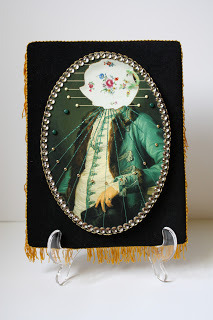 Mr Reynolds's studio was full of light. Sunbeams slanted through the windows and trapped tiny motes of dust in a lazy dance, and the smell of paint was raw in the back of Sarah's throat. She had been posing for the artist to make the last tiny alterations when her husband arrived to admire her wedding gift to him, and she had stepped behind the easel to inspect it with him. It was a strange feeling to see herself mirrored on the canvas. Did she really look that assured? That coolly certain of the world and her place in it? 'It's a good likeness,' Sir Richard commented at last. 'You have caught my wife's poise perfectly, Joshua. And her mouth …' He glanced down at Sarah, her face half hidden beneath the brim of that preposterous hat. '… yes, it is very like.'He had noticed her mouth. Such a little thing, but her heart had leapt. Sarah looked away, afraid that he would see the effect he had on her, afraid to let herself hope. A long mirror was propped against the wall, and she could see herself reflected twice, once on canvas and once with the plumes on her hat still nodding gently.Four Sarahs. Three cool, three poised. One achingly aware of her husband beside her. Two Richards. Sometimes it seemed to Sarah that she had indeed two husbands. There was the cool, dispassionate stranger who sat across the breakfast table from her, precise and keen-eyed, dauntingly courteous. And then there was the Richard who came to her at night, who reached for her in the darkness between the bed hangings. Whenever Sarah thought about the heat that flared between them there, remembered desire would shiver down her spine. In the dark, there was nothing but the touch of his hands, the feel of his lips against her skin, the warmth and the weight of him.In the dark, she didn't have to school her features to indifference.In the dark, she didn't have to pretend that she wasn't in love with her own husband.Mama had explained it all. It was Emma he had wanted, Emma who was so amiable, so beautiful, so dutiful. Emma who never rode astride or tore her skirts. Her sister, the pattern card of virtue. Of course Richard had wanted Emma.'But now Emma is married you will do for him just as well,' Mama had said. 'Don't hang upon him, and you will deal very well together.'Sarah might not have Emma's beauty and amiability, but she had her pride – and her £70,000 – and she knew the rules of a marriage such as hers. Richard would go his own way, and she would go hers. No one would ever guess the mortifying truth.That she had fallen in love with him the moment she had laid eyes on him. Nobody had warned Sarah that it would feel like that. The lurch of the heart, the sickening plunge of the stomach, the dizzy, vertiginous feeling. Her tongue, usually so quick, had cleaved to the top of her mouth, and she had been dull and stupid and shy with him.
Mr Reynolds's studio was full of light. Sunbeams slanted through the windows and trapped tiny motes of dust in a lazy dance, and the smell of paint was raw in the back of Sarah's throat. She had been posing for the artist to make the last tiny alterations when her husband arrived to admire her wedding gift to him, and she had stepped behind the easel to inspect it with him. It was a strange feeling to see herself mirrored on the canvas. Did she really look that assured? That coolly certain of the world and her place in it? 'It's a good likeness,' Sir Richard commented at last. 'You have caught my wife's poise perfectly, Joshua. And her mouth …' He glanced down at Sarah, her face half hidden beneath the brim of that preposterous hat. '… yes, it is very like.'He had noticed her mouth. Such a little thing, but her heart had leapt. Sarah looked away, afraid that he would see the effect he had on her, afraid to let herself hope. A long mirror was propped against the wall, and she could see herself reflected twice, once on canvas and once with the plumes on her hat still nodding gently.Four Sarahs. Three cool, three poised. One achingly aware of her husband beside her. Two Richards. Sometimes it seemed to Sarah that she had indeed two husbands. There was the cool, dispassionate stranger who sat across the breakfast table from her, precise and keen-eyed, dauntingly courteous. And then there was the Richard who came to her at night, who reached for her in the darkness between the bed hangings. Whenever Sarah thought about the heat that flared between them there, remembered desire would shiver down her spine. In the dark, there was nothing but the touch of his hands, the feel of his lips against her skin, the warmth and the weight of him.In the dark, she didn't have to school her features to indifference.In the dark, she didn't have to pretend that she wasn't in love with her own husband.Mama had explained it all. It was Emma he had wanted, Emma who was so amiable, so beautiful, so dutiful. Emma who never rode astride or tore her skirts. Her sister, the pattern card of virtue. Of course Richard had wanted Emma.'But now Emma is married you will do for him just as well,' Mama had said. 'Don't hang upon him, and you will deal very well together.'Sarah might not have Emma's beauty and amiability, but she had her pride – and her £70,000 – and she knew the rules of a marriage such as hers. Richard would go his own way, and she would go hers. No one would ever guess the mortifying truth.That she had fallen in love with him the moment she had laid eyes on him. Nobody had warned Sarah that it would feel like that. The lurch of the heart, the sickening plunge of the stomach, the dizzy, vertiginous feeling. Her tongue, usually so quick, had cleaved to the top of her mouth, and she had been dull and stupid and shy with him.
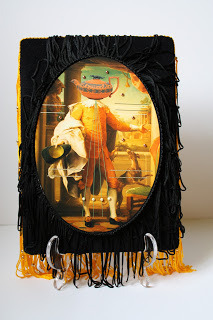 His offer of marriage had dazzled her with hope, and plunged her into a desperate sense of her own inadequacy. For her husband was everything Sarah was not. He was sensible and restrained; she was wilful and headstrong, a madcap, who rode neck-or-nothing and laughed too loud. A hoyden, her step-father had said, frowning.Richard was steeped in the classics, and had an organised and mathematical mind; Sarah had always preferred the stables to the schoolroom Her sewing was lumpy, her letters blotched, her figure trim but her face unremarkable. She was the last wife the serious Sir Richard Worsley should have chosen. There was nothing to recommend her to him.Except, of course, her marriage portion.Sarah never forgot that. She refused to hang on his sleeve and embarrass him with unfashionable affection. Love was for cits, not for the likes of Lady Worsley. The ton would titter behind their hands if they knew. So she gave herself over to fashion and frivolity and hid her desperate, unlikely passion behind a mask of careless gaiety.'See, I am wearing your regimental colours.' She pointed to the dark blue lapels with the silver frogging that looked so smart against the scarlet, using the light, bored voice she had deliberately cultivated, the one that disguised the flutter in her entrails, the buzzing beneath her skin whenever her husband was near. 'These military riding suits are all the rage.'Sir Richard, who had seen the bill for the outfit, merely nodded. Her dowry might have been signed over for his use, but Sarah, it seemed, had no intention of staying meekly at Appuldurcombe while he went about his business in Town. She was determined to take the ton by storm. She had plunged into the giddy social whirl with such enthusiasm that Richard hadn't had the heart to check her. The bills from her milliner and mantua maker were staggering, but when he had raised his brows at a hundred guineas for a pair of diamond encrusted shoes, Sarah had been quick to remind him while he might hold the purse strings, it was she who had provided the fortune he dispersed on her account. Sir Richard liked being reminded of his dependence no more than the next man. It was still a constant source of amazement to him to find himself in possession of such a wife. He had meant to marry someone demure, a sensible, intelligent woman who would provide him with an heir to Appuldorcombe and share his interests. Instead … Sir Richard glanced down at his wife, remembering the first time he had seen her. She had been just a girl, wild and lamentably wilful, and no beauty, but so vivid a personality that every other woman paled into insignificance beside her. She had burst into the drawing room, swinging her hat, her hair tumbled, her face flushed, and when she smiled, the charge in the air took his breath away. Sarah. Marrying her had been madness. She was not at all demure. She knew nothing of the Classics and while her tongue was sharp and she was quick at cards, she reserved her undoubted intelligence for gossip and her energy for dancing and riding and flirting with her coterie of admirers. 'George Bisset suggested the riding crop,' she was saying, using the crop in her hand to point to the one in the painting. 'Was it not clever of him? He said it would show my skill as an equestrienne.'
His offer of marriage had dazzled her with hope, and plunged her into a desperate sense of her own inadequacy. For her husband was everything Sarah was not. He was sensible and restrained; she was wilful and headstrong, a madcap, who rode neck-or-nothing and laughed too loud. A hoyden, her step-father had said, frowning.Richard was steeped in the classics, and had an organised and mathematical mind; Sarah had always preferred the stables to the schoolroom Her sewing was lumpy, her letters blotched, her figure trim but her face unremarkable. She was the last wife the serious Sir Richard Worsley should have chosen. There was nothing to recommend her to him.Except, of course, her marriage portion.Sarah never forgot that. She refused to hang on his sleeve and embarrass him with unfashionable affection. Love was for cits, not for the likes of Lady Worsley. The ton would titter behind their hands if they knew. So she gave herself over to fashion and frivolity and hid her desperate, unlikely passion behind a mask of careless gaiety.'See, I am wearing your regimental colours.' She pointed to the dark blue lapels with the silver frogging that looked so smart against the scarlet, using the light, bored voice she had deliberately cultivated, the one that disguised the flutter in her entrails, the buzzing beneath her skin whenever her husband was near. 'These military riding suits are all the rage.'Sir Richard, who had seen the bill for the outfit, merely nodded. Her dowry might have been signed over for his use, but Sarah, it seemed, had no intention of staying meekly at Appuldurcombe while he went about his business in Town. She was determined to take the ton by storm. She had plunged into the giddy social whirl with such enthusiasm that Richard hadn't had the heart to check her. The bills from her milliner and mantua maker were staggering, but when he had raised his brows at a hundred guineas for a pair of diamond encrusted shoes, Sarah had been quick to remind him while he might hold the purse strings, it was she who had provided the fortune he dispersed on her account. Sir Richard liked being reminded of his dependence no more than the next man. It was still a constant source of amazement to him to find himself in possession of such a wife. He had meant to marry someone demure, a sensible, intelligent woman who would provide him with an heir to Appuldorcombe and share his interests. Instead … Sir Richard glanced down at his wife, remembering the first time he had seen her. She had been just a girl, wild and lamentably wilful, and no beauty, but so vivid a personality that every other woman paled into insignificance beside her. She had burst into the drawing room, swinging her hat, her hair tumbled, her face flushed, and when she smiled, the charge in the air took his breath away. Sarah. Marrying her had been madness. She was not at all demure. She knew nothing of the Classics and while her tongue was sharp and she was quick at cards, she reserved her undoubted intelligence for gossip and her energy for dancing and riding and flirting with her coterie of admirers. 'George Bisset suggested the riding crop,' she was saying, using the crop in her hand to point to the one in the painting. 'Was it not clever of him? He said it would show my skill as an equestrienne.'
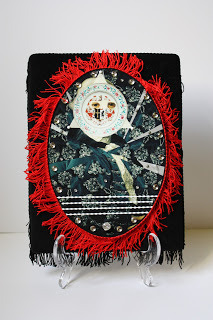 His neighbour was the most assiduous of her court. Wherever Sarah went, there was Bisset to bow over her hand and press his lips to her wrist, to flatter and flirt in a way Richard had never been able to do.Sarah's smile was brittle, and it pierced Richard with regret. It was always like that now, the smile of a fashionable woman, not of the vital girl who had captured his reluctant heart. The moment the settlements had been agreed, Sarah had changed. She had made it very plain that a marriage of convenience suited her perfectly. 'No one expects me to live in your pocket,' she had said gaily.Richard should have been pleased. It was the practical arrangement he had planned when he had first contemplated matrimony. He should have been delighted that she had reformed her hoydenish ways, that she fit so well into the ton. She was to be found at every rout, every assembly, every ball. She was cool and polished and everything a wife should be.But dammit, he missed the wilful passionate girl he had married. Sir Richard longed to find her again, but didn't know how to reach her now.His eyes lingered on the portrait. Sarah was still there, beneath that coolly confident exterior, he was sure of it. Clever the way Reynolds had suggested the way she brimmed with suppressed energy, as if all her warmth and vitality had been forced under control and might pop the buttons on her tight waistcoat any minute.In the picture, beside him, she was modestly covered from the tip of her satin clad feet to the expensive kid gloves, and there was a foam of lace at her throat, and looking at the portrait, Richard felt a thrill of possession. Only he knew how warm and soft she was beneath that snugly fitting jacket. He knew how sensitive was the skin behind her knee, the way she shivered when he pressed his mouth to the curve of her shoulder. Glancing at her now, he saw that Sarah was talking to Joshua Reynolds, her expression eager and alert, the way it had been when he first met her, and he clasped his hands tighter together behind his back for fear they would reach for her of their own accord. He wanted to pull her back to him, to smile at him that way again. He wanted to take her home in the carriage, to unbutton her gloves and peel them from her
His neighbour was the most assiduous of her court. Wherever Sarah went, there was Bisset to bow over her hand and press his lips to her wrist, to flatter and flirt in a way Richard had never been able to do.Sarah's smile was brittle, and it pierced Richard with regret. It was always like that now, the smile of a fashionable woman, not of the vital girl who had captured his reluctant heart. The moment the settlements had been agreed, Sarah had changed. She had made it very plain that a marriage of convenience suited her perfectly. 'No one expects me to live in your pocket,' she had said gaily.Richard should have been pleased. It was the practical arrangement he had planned when he had first contemplated matrimony. He should have been delighted that she had reformed her hoydenish ways, that she fit so well into the ton. She was to be found at every rout, every assembly, every ball. She was cool and polished and everything a wife should be.But dammit, he missed the wilful passionate girl he had married. Sir Richard longed to find her again, but didn't know how to reach her now.His eyes lingered on the portrait. Sarah was still there, beneath that coolly confident exterior, he was sure of it. Clever the way Reynolds had suggested the way she brimmed with suppressed energy, as if all her warmth and vitality had been forced under control and might pop the buttons on her tight waistcoat any minute.In the picture, beside him, she was modestly covered from the tip of her satin clad feet to the expensive kid gloves, and there was a foam of lace at her throat, and looking at the portrait, Richard felt a thrill of possession. Only he knew how warm and soft she was beneath that snugly fitting jacket. He knew how sensitive was the skin behind her knee, the way she shivered when he pressed his mouth to the curve of her shoulder. Glancing at her now, he saw that Sarah was talking to Joshua Reynolds, her expression eager and alert, the way it had been when he first met her, and he clasped his hands tighter together behind his back for fear they would reach for her of their own accord. He wanted to pull her back to him, to smile at him that way again. He wanted to take her home in the carriage, to unbutton her gloves and peel them from her © Jessica Hart 2011
Published on January 16, 2012 06:49
January 11, 2012
Writing effective English: my top tips
After the excitement of being nominated for a writing blog award by eCollege Finder last week, I have been giving some thought to what advice I could offer to students who want to improve their writing skills.

As usual, this has ended up as a much longer post than I intended (ramble? moi?) but for those who can't be bothered to read to the end (and hey, we're aiming at students, so might as well be realistic), here are my top tips for writing effective English:
1. Be clear about WHAT you're writing.2. Check the guidelines before you start.3. Have a clear structure in mind.4. Start specific.5. Know how to deal with block: bird by bird.6. Draft.7. Keep language simple and natural.8. Perfect your presentation and your punctuation: learn to use a full stop and an apostrophe!
As it happens, all of these tips apply equally to other kinds of writing, and I could just as well have written them with romance writers, rather than students, in mind. Whatever you're writing, I hope you'll find some of the advice below useful - although you might want to bear in mind my final tip, which is to do as I say, and not as I do!
DECIDE WHAT YOU'RE WRITING
Your first step in effective writing is to understand exactly what it is you want to do. Do you need to write an essay or a PhD thesis? A dissertation or a research proposal? Are you emailing a lecturer, or contacting a friend?
If you need to present a formal piece of work, make sure you understand precisely what it is you are required to produce. Are you answering a question, or exploring an argument? Is it enough to simply write up your research, or do you need to form it into a coherent argument?
CHECK THE GUIDELINES
Aspiring authors get sick of being told to check the guidelines, but it's good advice, and you will save yourself a lot of time if you know what you're doing. If you're asked to write a 2,000 word essay, for instance, there's no point in writing 5,000 words, just as there's no point in submitting a 100,000 word gritty thriller to Mills & Boon. If you're told to include footnotes, put them in - and in the correct format!
STRUCTURE
OK, you know what you need to do. Time to get typing, right? Wrong! I strongly suggest that you give some thought to your outline structure before you write a word. True, some writers prefer to sit down and see where the words take them, but it's all too easy to get lost that way, and if you're at all unsure about your writing ability, you'll find it much easier to have a framework to hang your words on right from the start. At the very least you'll need a beginning, a middle and an end, an introduction, an argument and a conclusion, or whatever labels you want to put on the time-honoured three part structure. I'd then jot down the main points I wanted to include in each section, but not everyone has my fetish about organising life into lists, I know. Still, I reckon it can only be helpful.
START SPECIFIC Now you're ready to start writing? Hold on, not quite yet ... The temptation is to plunge in, but it's worth giving your introduction a bit of thought. A good friend of mine is an English lecturer and I asked him the other day about the advice he gives to students struggling with essays. Too often, he said, essays begin in a rambling way. It's much more effective to start with the specific – a quotation from a text, say, or a moment in time – and build your argument out from that. I've never written an essay for the a science subject, for instance, but I don't see why the same shouldn't be true for other disciplines too. Start specific.
This is good advice for creative writing too. A rambling beginning choc-a-bloc with backstory is a common mistake in manuscripts I see. It doesn't matter if you're writing fiction or non-fiction, cut straight to the chase. Readers don't want to be bored by the set up. They want to be sucked straight into what's important. In a romance, that's when the hero and heroine meet, or at a point of change or crisis in their relationship. In an essay, find some nugget of information or a quotation or something that encapsulates the argument you're going to make.
DEALING WITH BLOCK (aaarrrggghh)
Right, so you've got the perfect quotation to start. You've got an outline. You're full of ideas. You're ready to go. And yet, if you're anything like me, this is the very point when the words refuse to come. It all seems too daunting. A 2000 word essay, a 90,000 word thesis, a 150,000 word novel … however short or long it is, the prospect of ordering all your material, presenting your argument or telling the story you have to tell can be overwhelming. Your fingers freeze on the keyboard, your heart pounds in panic … I know, I've been there, more times than I can tell!
The best advice I ever read about dealing with this awful feeling of paralysis comes from Bird by Bird: Instructions on Writing and Life , by Anne Lamott. A wonderful writer, Lamott tells the story from her childhood about her brother, who at the end of the holidays was paralysed with fear at the size of the project about birds that he was supposed to have been doing over the previous weeks. On the last night, he sat despairingly at the table, surrounded by books about birds and with no idea where to start. Their father sat down beside him and put an arm around his shoulders. 'Take it bird by bird, buddy,' he said. 'Bird by bird.'
I may not have quoted it exactly, but I love this story. It's a lesson for life as well as writing, I think. When it all seems too much, don't think about how much you have to do. Just think about writing the first line, or the first paragraph. Aim to do your introduction, or two pages. Don't think beyond that. As one of the great listmakers of the universe, I give myself a timetable, with targets of a certain number of words or pages to do a day, but you don't need to go to those lengths. Do a little at a time - bird by bird, in fact – and the essay/thesis/novel will get written.
DRAFT, DRAFT, DRAFT
I'm also a big fan of drafts. The thought of turning out perfect prose at the first attempt is too intimidating, so I start with a rough, rubbishy draft, and then I expand it to make a full draft, and as a last step, I expand again and polish. I'm terrified by the blank page and always find it easier to work from something, however crappy (and believe me, it can be very crappy at this stage, as I am discovering, going back to a rough draft after the Christmas break!)
Oh dear, this seems to be turning into a very long post. Pithy is something I just can't do. But having started, as they say, I'm going to finish, and besides, it's not often I get the encouragement to pontificate. So just two more points.
KEEP IT SIMPLE
Writing is about communication. It's about getting what's inside your head into someone else's head, and it's a powerful tool. Often people are afraid of writing, especially in a formal context like academic essays and dissertations, and they make their language too complicated. Clear is not the same as casual. Cut any word that doesn't come naturally to you and replace it with one that does. This applies as much to fiction writers as to everyone else. Avoid elaborate constructions or the passive voice or jargon. They're all horrible to read. If you're not confident about your writing, start by simply writing down what you would say out loud.
For an academic essay, of course, you'll need to expand contractions ("don't" becomes "do not", "he'll" becomes "he will" etc.) but you can do that at the polishing stage. For your first draft, just write it as you would say it, and the moment you find yourself trying to impress with a clever word, stop, and stick with the one you thought of in the first place! A final draft will allow you to polish, check for missing words and misplaced commas and apostrophes (see below) and run a spell check. Sloppy presentation won't affect the meaning of what you have written, but it will make it less effective, as it will be so much harder to read. And why irritate your tutor/editor unnecessarily?
PERFECT PUNCTUATION
Last, but absolutely not least, learn how to punctuate correctly. In particularly, make sure you know how to use a full stop! Too often people lose themselves in the middle of a sentence and shove in a random comma. This is one of my pet hates, so please, please, don't do it. Read your sentence out loud. If you run out of breath, it's too long and complicated. If in doubt, keep it short and sweet, stop and start a new sentence.
And while I'm at it, learn how to use an apostrophe too. It isn't difficult! The easiest way to remember is to think that the apostrophe stands for something that's missing – which I could have written as 'that is missing' instead, but that isn't (is not) in keeping with the informal style of this blog! There are various websites telling you how to use an apostrophe if you're not sure, or if you want to brush up your punctuation (and you should if you want to write effectively!) Jenny Haddon has written a clear and very useful book just for you called Getting the Point, and I thoroughly recommend that you, er, get it.

As usual, this has ended up as a much longer post than I intended (ramble? moi?) but for those who can't be bothered to read to the end (and hey, we're aiming at students, so might as well be realistic), here are my top tips for writing effective English:
1. Be clear about WHAT you're writing.2. Check the guidelines before you start.3. Have a clear structure in mind.4. Start specific.5. Know how to deal with block: bird by bird.6. Draft.7. Keep language simple and natural.8. Perfect your presentation and your punctuation: learn to use a full stop and an apostrophe!
As it happens, all of these tips apply equally to other kinds of writing, and I could just as well have written them with romance writers, rather than students, in mind. Whatever you're writing, I hope you'll find some of the advice below useful - although you might want to bear in mind my final tip, which is to do as I say, and not as I do!
DECIDE WHAT YOU'RE WRITING
Your first step in effective writing is to understand exactly what it is you want to do. Do you need to write an essay or a PhD thesis? A dissertation or a research proposal? Are you emailing a lecturer, or contacting a friend?
If you need to present a formal piece of work, make sure you understand precisely what it is you are required to produce. Are you answering a question, or exploring an argument? Is it enough to simply write up your research, or do you need to form it into a coherent argument?
CHECK THE GUIDELINES
Aspiring authors get sick of being told to check the guidelines, but it's good advice, and you will save yourself a lot of time if you know what you're doing. If you're asked to write a 2,000 word essay, for instance, there's no point in writing 5,000 words, just as there's no point in submitting a 100,000 word gritty thriller to Mills & Boon. If you're told to include footnotes, put them in - and in the correct format!
STRUCTURE
OK, you know what you need to do. Time to get typing, right? Wrong! I strongly suggest that you give some thought to your outline structure before you write a word. True, some writers prefer to sit down and see where the words take them, but it's all too easy to get lost that way, and if you're at all unsure about your writing ability, you'll find it much easier to have a framework to hang your words on right from the start. At the very least you'll need a beginning, a middle and an end, an introduction, an argument and a conclusion, or whatever labels you want to put on the time-honoured three part structure. I'd then jot down the main points I wanted to include in each section, but not everyone has my fetish about organising life into lists, I know. Still, I reckon it can only be helpful.
START SPECIFIC Now you're ready to start writing? Hold on, not quite yet ... The temptation is to plunge in, but it's worth giving your introduction a bit of thought. A good friend of mine is an English lecturer and I asked him the other day about the advice he gives to students struggling with essays. Too often, he said, essays begin in a rambling way. It's much more effective to start with the specific – a quotation from a text, say, or a moment in time – and build your argument out from that. I've never written an essay for the a science subject, for instance, but I don't see why the same shouldn't be true for other disciplines too. Start specific.
This is good advice for creative writing too. A rambling beginning choc-a-bloc with backstory is a common mistake in manuscripts I see. It doesn't matter if you're writing fiction or non-fiction, cut straight to the chase. Readers don't want to be bored by the set up. They want to be sucked straight into what's important. In a romance, that's when the hero and heroine meet, or at a point of change or crisis in their relationship. In an essay, find some nugget of information or a quotation or something that encapsulates the argument you're going to make.
DEALING WITH BLOCK (aaarrrggghh)
Right, so you've got the perfect quotation to start. You've got an outline. You're full of ideas. You're ready to go. And yet, if you're anything like me, this is the very point when the words refuse to come. It all seems too daunting. A 2000 word essay, a 90,000 word thesis, a 150,000 word novel … however short or long it is, the prospect of ordering all your material, presenting your argument or telling the story you have to tell can be overwhelming. Your fingers freeze on the keyboard, your heart pounds in panic … I know, I've been there, more times than I can tell!
The best advice I ever read about dealing with this awful feeling of paralysis comes from Bird by Bird: Instructions on Writing and Life , by Anne Lamott. A wonderful writer, Lamott tells the story from her childhood about her brother, who at the end of the holidays was paralysed with fear at the size of the project about birds that he was supposed to have been doing over the previous weeks. On the last night, he sat despairingly at the table, surrounded by books about birds and with no idea where to start. Their father sat down beside him and put an arm around his shoulders. 'Take it bird by bird, buddy,' he said. 'Bird by bird.'
I may not have quoted it exactly, but I love this story. It's a lesson for life as well as writing, I think. When it all seems too much, don't think about how much you have to do. Just think about writing the first line, or the first paragraph. Aim to do your introduction, or two pages. Don't think beyond that. As one of the great listmakers of the universe, I give myself a timetable, with targets of a certain number of words or pages to do a day, but you don't need to go to those lengths. Do a little at a time - bird by bird, in fact – and the essay/thesis/novel will get written.
DRAFT, DRAFT, DRAFT
I'm also a big fan of drafts. The thought of turning out perfect prose at the first attempt is too intimidating, so I start with a rough, rubbishy draft, and then I expand it to make a full draft, and as a last step, I expand again and polish. I'm terrified by the blank page and always find it easier to work from something, however crappy (and believe me, it can be very crappy at this stage, as I am discovering, going back to a rough draft after the Christmas break!)
Oh dear, this seems to be turning into a very long post. Pithy is something I just can't do. But having started, as they say, I'm going to finish, and besides, it's not often I get the encouragement to pontificate. So just two more points.
KEEP IT SIMPLE
Writing is about communication. It's about getting what's inside your head into someone else's head, and it's a powerful tool. Often people are afraid of writing, especially in a formal context like academic essays and dissertations, and they make their language too complicated. Clear is not the same as casual. Cut any word that doesn't come naturally to you and replace it with one that does. This applies as much to fiction writers as to everyone else. Avoid elaborate constructions or the passive voice or jargon. They're all horrible to read. If you're not confident about your writing, start by simply writing down what you would say out loud.
For an academic essay, of course, you'll need to expand contractions ("don't" becomes "do not", "he'll" becomes "he will" etc.) but you can do that at the polishing stage. For your first draft, just write it as you would say it, and the moment you find yourself trying to impress with a clever word, stop, and stick with the one you thought of in the first place! A final draft will allow you to polish, check for missing words and misplaced commas and apostrophes (see below) and run a spell check. Sloppy presentation won't affect the meaning of what you have written, but it will make it less effective, as it will be so much harder to read. And why irritate your tutor/editor unnecessarily?
PERFECT PUNCTUATION
Last, but absolutely not least, learn how to punctuate correctly. In particularly, make sure you know how to use a full stop! Too often people lose themselves in the middle of a sentence and shove in a random comma. This is one of my pet hates, so please, please, don't do it. Read your sentence out loud. If you run out of breath, it's too long and complicated. If in doubt, keep it short and sweet, stop and start a new sentence.
And while I'm at it, learn how to use an apostrophe too. It isn't difficult! The easiest way to remember is to think that the apostrophe stands for something that's missing – which I could have written as 'that is missing' instead, but that isn't (is not) in keeping with the informal style of this blog! There are various websites telling you how to use an apostrophe if you're not sure, or if you want to brush up your punctuation (and you should if you want to write effectively!) Jenny Haddon has written a clear and very useful book just for you called Getting the Point, and I thoroughly recommend that you, er, get it.
Published on January 11, 2012 10:10

